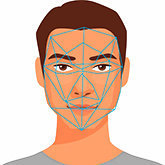Face ID with face heat mapping of smartphone user. Apple biometrics will not be terrible with protective masks
Source: Pure PC added 21st Jan 2021Biometrics in smartphones is constantly evolving, while Apple has been focusing on facial recognition for a long time. Face ID is based on infrared and can easily detect the user even in complete darkness. Unfortunately, in times of the coronavirus pandemic, we often cover our face with protective masks, which in some cases is mandatory. Face ID is completely unable to cope in such situations, but the Cupertino giant apparently wants to remedy it. The company has just obtained a patent for the face heat mapping function, which can go to the Face ID scanner on Apple iPhone smartphones. So let’s check how the solution would work.
Apple patents a completely new method of biometric security of smartphones. Face ID will be enhanced with face heat mapping.
Apple iPhone test 12 – a smartphone that cuts itself off from the past
The times when we secure our devices only with PINs, passwords or patterns are a thing of the past. Fingerprint readers are becoming more precise, and some of them have even hit the screens of mobile devices. Apple focuses on face recognition, i.e. Face ID. The problem is that covering your mouth and nose with a mask makes the system completely useless. Here the fingerprint scanner works much better. There are rumors that Apple is going to use this solution, but new information sheds some light on biometrics in iPhones.
Test Apple iPhone 12 – a smartphone that cuts itself off from the past
The company has patented the user face heat mapping function, which is unique to every human being and it would be quite reasonable to use this solution in Face ID. This would eliminate the problem of wearing the mask. Today, making payments via Apple Pay or simply unlocking your smartphone using your face is basically impossible due to the prevailing restrictions. I would not be surprised if both of these biometric security methods would be included in iPhones.
Source: Patently Apple
